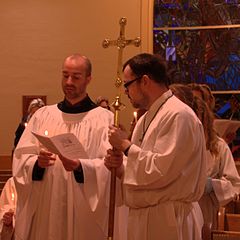Fiesta de la Candelaria (Puno)
| Candlemas Candlemass Candlemas Day |
|
|---|---|

Blessing of candles on Candlemas at an Episcopal Church in the United States
|
|
| Also called | Feast of the Presentation of Our Lord Jesus Feast of the Purification of the Blessed Virgin Mary |
| Observed by | Christians |
| Significance | Commemoration of the presentation of Jesus at the Temple |
| Observances | Having candles blessed for the year during a Mass or Service of Worship; removal of Christmas decorations in some localities |
| Date | February 2 |
| Frequency | Annual |
| Related to | Christmastide, Epiphanytide |
Candlemas (also spelled Candlemass), also known as the Feast of the Presentation of Our Lord Jesus and the Feast of the Purification of the Blessed Virgin Mary, is a Christian Holy Day commemorating the presentation of Jesus at the Temple. It is based upon the account of the presentation of Jesus in Luke 2:22–40. In accordance with Leviticus 12: a woman was to be presented for purification by sacrifice 33 days after a boy's circumcision. It falls on February 2, which is traditionally the 40th day of the Christmas–Epiphany season. While it is customary for Christians in some countries to remove their Christmas decorations on Twelfth Night (Epiphany Eve), those in other Christian countries historically remove them on Candlemas. On Candlemas, many Christians (especially Anglicans, Methodists, Lutherans, Orthodox and Roman Catholics) also bring their candles to their local church, where they are blessed and then used for the rest of the year; for Christians, these blessed candles serve as a symbol of Jesus Christ, who referred to himself as the Light of the World.
The Feast of the Presentation is one of the oldest feasts of the Christian church, celebrated since the 4th century AD in Jerusalem. There are sermons on the Feast by the bishops Methodius of Patara (died 312), Cyril of Jerusalem (died 360), Gregory the Theologian (died 389), Amphilochius of Iconium (died 394), Gregory of Nyssa (died 400), and John Chrysostom (died 407). It is also mentioned in the pilgrimage of Egeria (381–384), where she confirmed that the celebrations took place in honor of the presentation of Jesus at the Temple.
...
Wikipedia
